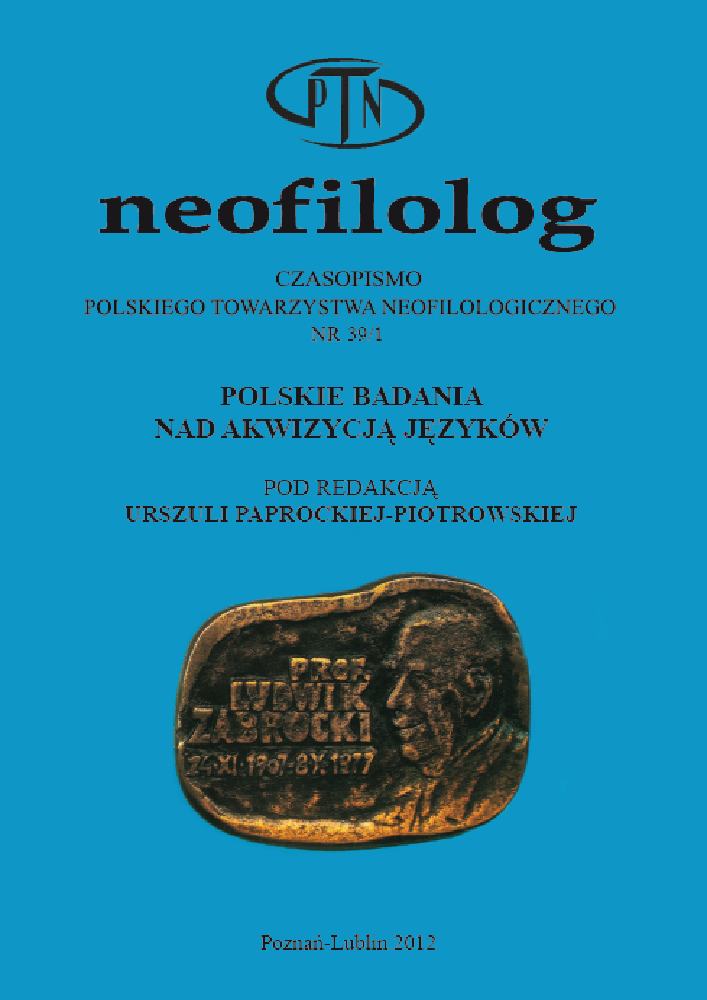Abstrakt
In the article I am presenting the course of the process of learning vocabulary activated while teaching a foreign language. The paper takes the models of information processing and input processing as a starting point to describe the phases of vocabulary learning and to implicate the teaching procedures based on the insights in the natural processes of language acquisition. It provides theoretical background referring to the concept of instructed learning understood as the possibility of steering learners’ perception and processing of lexical structures by the teacher, and also examples on how to use this knowledge in the classroom.
Bibliografia
Butzkamm, W. 1993. Psycholinguistik des Fremdsprachenunterrichts: natürliche Künstlichkeit von der Muttersprache zur Fremdsprache. Tübingen: Francke.
De Florio-Hansen, I. 1991. „FSU und ZSE. Ein Vergleich der Sprachaufnahmeprobleme”. Praxis des neusprachlichen Unterrichts 4/1991: 339-345.
Engelkamp. J. 1985. „Die Repräsentationen der Wortbedeutung” (w) Handbuch der Lexikologie (red. Ch. Schwarze, D. Wundrlich) Königsstein/TS: Athenäum: 292-313.
Gass, S. M. 1997. Input, Interaction and the Second Language Learner. Mahwah, New Jersey: Lawrence Erlbaum Associates.
Huneke, H.-W., Steinig, W. 2002. Deutsch als Fremdsprache: eine Einführung. Berlin: Erich Schmidt.
Kesseler, H.J. 2004 Didaktische Strategien beim Wissenstransfer im Spannungsfeld von Bildungsdidaktischen und kommunikationswissenschaftlichen Ansprüchen. www.edoc.ub.uni-muenchen.de/archive/00003246/01/Kesseler_Hansjoachim.pdf DW 12.05.2006.
Komorowska, H. 2002. Metodyka nauczania języków obcych. Warszawa: Fraszka Edukacyjna.
Krashen, S. 1985. The Input Hypothesis: Issues and implications. London,New York: Longman.
Lewicka, G. 2007. Glottodydaktyczne aspekty akwizycji języka drugiego a konstruktywistyczna teoria uczenia się. Wrocław: Oficyna Wydawnicza Atut – Wrocławskie Wydawnictwo Oświatowe.
Pfeiffer, W. 1986. „Wissenschaftliche Grundlagen der Fremdsprachendidaktik”. Deustch als Fremdsprache IV: 215-219.
Raczyńska, M. 2007. „Kompetencje lingwistyczne, socjolingwistyczne, pragmatyczne i funkcjonalne w uczeniu się i nauczaniu języka według standardów Europejskiego Systemu Opisu Kształcenia Językowego” (w) Materiały z IV Międzynarodowej Konferencji Edukacyjnej „Przez Języki Obce do Sukcesu”, Ustroń: 169-175.
Sadownik, B. 1981. Implikationen der Zweitsprachenerwerbsforschung. Lublin: Wydawnictwo UMCS.
Scherfer, P. 1988. „Überlegungen zum Wortschatzlernen im Fremdspracheunterricht” (w) Aspekte des Lernens und Lehrens von Fremdsprachen (red. A. Rasch, M. Bludau, F. J. Zapp) Frankfurt nad Menem: Moritz Diesterweg Verlag: 28-51.
Schmidt, G. 1986. „Fremdsprachlicher Unterricht mit mehr Motivation – Übertragung didaktischer Teilkompetenzen auf den Schüler bei der Methode von Jean-Pol Martin”. Die Bayerische Realschule 11/86: 16-20.
Sharwood Smith, M. 1994. Second Language Learning: Theoretical Foundations. Longmann.
Szczordowski, M. 2000. „Glottokodematyka i jej zakresy badawcze” (w) Problemy komunikacji międzykulturowej. Lingwistyka, translatoryka, glottodydaktyka (red. B. Kielar, T. Krzeszowski, J. Lukszyn, T. Namowicz). Warszawa: Graf Punkt: 428-450.
Vogel, K. 1989. Aspekte der Lernersprache als Forschungskonzept des Zweitsprachenerwerbs. Göttingen Wilczyńska, W., Michońska-Stadnik, A. 2010. Metodologia badań w glottodydaktyce. Wprowadzenie. Kraków: Avalon/Flair.
Wode, H. 1993. Psycholinguistik: eine Einführung in die Lehr- und Lernbarkeit von Sprachen. Ismaning: Hueber.
Licencja
Prawa autorskie (c) 2012 Agnieszka Kubiczek

Utwór dostępny jest na licencji Creative Commons Uznanie autorstwa – Bez utworów zależnych 4.0 Międzynarodowe.
Przedstawiany utwór (artykuł) upubliczniany jest na podstawie umowy z autorem i na licencji Creative Commons Attribution-NoDerivatives 4.0 International (CC BY-ND 4.0).
Użytkownicy mają obowiązek podania wraz z rozpowszechnionym utworem, informacji o autorstwie, tytule, źródle (odnośniki do oryginalnego utworu, DOI) oraz samej licencji;
- bez tworzenia utworów zależnych,
- utwór musi być zachowany w oryginalnej postaci.
Uniwersytet im. Adama Mickiewicza w Poznaniu zachowuje prawo do czasopisma jako całości (układ, forma graficzna, tytuł, projekt okładki, logo itp.).
